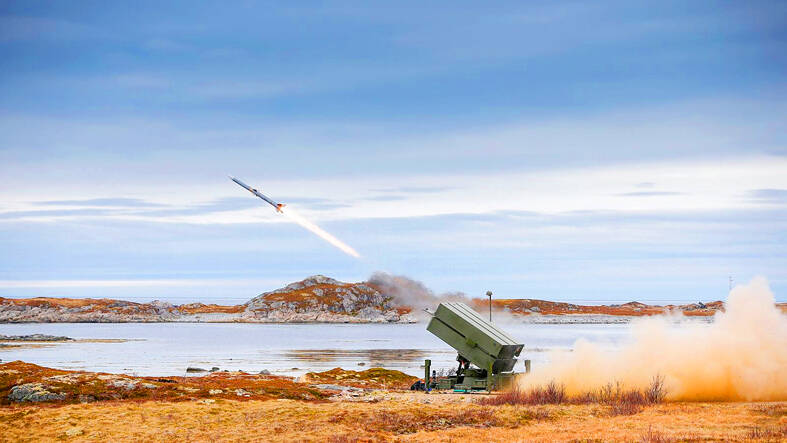Raytheon has been awarded a nearly US$700 million contract to produce National Advanced Surface-to-Air Missile System (NASAMS) units for Taiwan, expected to be completed by Feb. 28, 2031, the US Department of Defense announced on Monday.
The award was placed by the US Army Contracting Command and is part of a broader foreign military sales package intended to strengthen Taiwan’s ground-based air defense systems.
The system has been battle-tested in Ukraine, while in the Indo-Pacific region, only Australia and Indonesia now operate the system, three of which the US last year said that Taiwan would receive as part of a US$2 billion weapons sale.

Photo: screen grab from the Raytheon Web site
The Pentagon said the company was given a fixed-price contract for procurement of the NASAMS units.
“Fiscal 2026 foreign military sales [to Taiwan] funds in the amount of [US]$698,948,760 were obligated,” it said in a statement on Monday.
The Ministry of National Defense last year said that US-supplied NASAMS units would strengthen Taiwan’s air defenses, especially amid frequent Chinese military activity around the Taiwan Strait.
The NASAMS units would be paired with two new radar systems, effectively boosting target detection and anti-interference capabilities, and could be deployed with existing air defense units to form a stronger multilayered defense, the ministry said.
Next year’s national defense budget included about NT$35.7 billion (US$1.14 billion) for the NASAMS program running from last year to 2030, with the purchasing scope including radar, launch systems, training and preparation.
The air force said that growing airborne threats to key bases and radar sites require a mobile, integrated air defense system that can distribute firepower and build a multilayered interception network to protect critical infrastructure.
“It should be clear today and will remain clear into the future that America’s commitments to Taiwan are rock solid,” American Institute in Taiwan Director Raymond Greene said at an event held by the American Chamber of Commerce in Taiwan on Tuesday.
“We are backing these words with actions, with a focus on supporting Taiwan’s efforts to achieve peace through strength. Nowhere is this more apparent than in our growing defense industrial cooperation,” Greene said.
The US Department of State on Thursday last week announced a US$330 million sale of fighter jet parts to Taiwan, the first announcement of an arms sale to Taiwan since US President Donald Trump began his second term, prompting thanks from Taipei and anger in Beijing.
The arms sales come amid a worsening diplomatic crisis between Beijing and Tokyo over Taiwan.
Asked about the tensions yesterday, Minister of National Defense Wellington Koo (顧立雄) said that “China should abandon its thinking of using force to resolve things.”
China’s military operates around Taiwan on an almost daily basis in what Taipei views as a “gray zone” strategy to test and exhaust Taiwan’s military forces.
Despite a lack of formal diplomatic ties, the US is bound by law to provide Taiwan with the means to defend itself, to the constant anger of Beijing.

Trips for more than 100,000 international and domestic air travelers could be disrupted as China launches a military exercise around Taiwan today, Taiwan’s Civil Aviation Administration (CAA) said yesterday. The exercise could affect nearly 900 flights scheduled to enter the Taipei Flight Information Region (FIR) during the exercise window, it added. A notice issued by the Chinese Civil Aviation Administration showed there would be seven temporary zones around the Taiwan Strait which would be used for live-fire exercises, lasting from 8am to 6pm today. All aircraft are prohibited from entering during exercise, it says. Taipei FIR has 14 international air routes and

Taiwan lacks effective and cost-efficient armaments to intercept rockets, making the planned “T-Dome” interception system necessary, two experts said on Tuesday. The concerns were raised after China’s military fired two waves of rockets during live-fire drills around Taiwan on Tuesday, part of two-day exercises code-named “Justice Mission 2025.” The first wave involved 17 rockets launched at 9am from Pingtan in China’s Fujian Province, according to Lieutenant General Hsieh Jih-sheng (謝日升) of the Office of the Deputy Chief of the General Staff for Intelligence at the Ministry of National Defense. Those rockets landed 70 nautical miles (129.6km) northeast of Keelung without flying over Taiwan,

The Ministry of National Defense (MND) today released images of the military tracking China’s People's Liberation Army (PLA) movements during the latest round of Chinese drills around Taiwan. The PLA began "Justice Mission 2025" drills today, carrying out live-fire drills, simulated strikes on land and maritime targets, and exercises to blockade the nation's main ports. The exercises are to continue tomorrow, with the PLA announcing sea and air space restrictions for five zones around Taiwan for 10 hours starting from 8:30am. The ministry today released images showing a Chinese J-16 fighter jet tracked by a F-16V Block 20 jet and the

City buses in Taipei and New Taipei City, as well as the Taipei MRT, would on Saturday begin accepting QR code payments from five electronic payment providers, the Taipei Department of Transportation said yesterday. The new option would allow passengers to use the “transportation QR code” feature from EasyWallet, iPass Money, iCash Pay, Jkopay or PXPay Plus. Passengers should open their preferred electronic payment app, select the “transportation code” — not the regular payment code — unlock it, and scan the code at ticket readers or gates, General Planning Division Director-General Liu Kuo-chu (劉國著) said. People should move through the